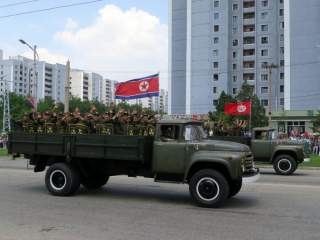Here's a Tip: Don't Give North Korea More Aid
"No matter what promises North Korea makes and agreements North Korea signs, nothing is likely to change."
However, Washington should allow truly private aid (in contrast to funneling U.S. government food through nominally private NGOs, as is common). Such assistance carries no imprimatur of political support. Aid groups more easily can adapt their policy to Pyongyang’s compliance with monitoring conditions; political objectives don’t interfere (at least as obviously) with feeding decisions. In fact, small groups with no evident political agenda have succeeded in working in the North, improving and saving lives without strengthening the regime’s hold on power.
Moreover, the North appears to be less vulnerable to disaster than two decades ago. Although reform has been inadequate, the North now benefits from two decades of spreading markets. Noted Kookmin University’s Andrei Lankov: “Agriculture is much less state-run and much more private than it used to be, and the farmer who work for themselves work better and with greater efficiency.” Indeed, close to a third of agricultural efforts are estimated to be devoted to private production. This year farmers have been mobilized both publicly and privately to increase food production.
Moreover, distribution of goods, including food, increasingly has shifted to private markets. Indeed, that is how many North Koreans survived during the 1990s famine. As the state distribution system broke down, many people turned to the black market for food. Since then the regime has largely tolerated this growing market system. Such a process will help distribute even limited food supplies to people today.
Refusing to provide aid does not mean Washington should not talk with the North. Historically, Pyongyang has been less confrontational while involved in negotiations with other states. More limited objectives, such as limits on missile development, withdrawal of advanced conventional units, and even caps on nuclear capabilities, also might be achievable. The United States should keep its expectations quite low—and not pay anything for mere promises.
North Korea is a continuing tragedy. There is no easy or simple policy guaranteed to end confrontation on the peninsula. In fact, so far almost everything has failed. Including providing government aid to the DPRK. If famine again does strike, the United States and its allies should tell Pyongyang no.
Doug Bandow is a Senior Fellow at the Cato Institute and a former Special Assistant to President Ronald Reagan. He is the author of Tripwire: Korea and U.S. Foreign Policy in a Changed World and co-author of The Korean Conundrum: America’s Troubled Relations with North and South Korea.
Image: Flickr/rapidtravelchai

